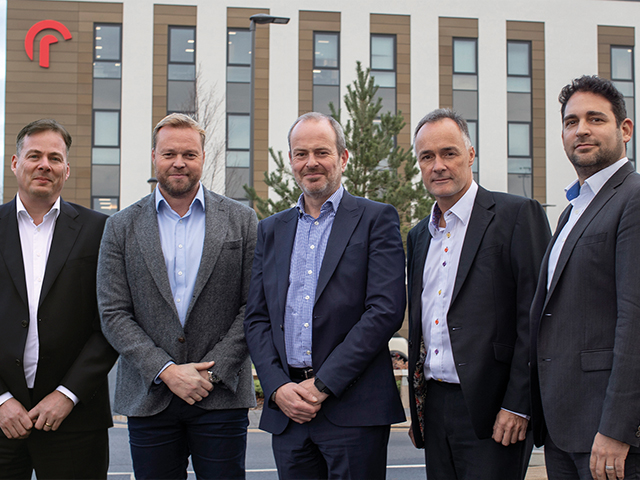

Fuel card and telematics giant Radius is raring to grow its telecoms offering following acquisitions
On more than one occasion during our conversation, Ray Ferris breaks into a smile mid-sentence. Given the role he’s just stepped into, it’s easy to see why. As a man who has dedicated much of his professional life to telecoms, he’s finally found himself in a role in which the decisions he makes reverberate throughout an entire business.
Ferris is settling into his new role as group MD for telecoms at Radius Payment Solutions that he began at the start of November. The Crewe-headquartered fuel card and telematics giant, which has 26 offices in 15 countries, has begun to make strides into the telecoms world in the past year. This started with its October 2018 acquisition of Chiswick’s Adam Phones, where Ferris is based and where we meet.
Following that, the firm established its own telecoms company, Echo, this June, before adding dealer success stories Pure Telecom in Shrewsbury and Trinity Maxwell in Shoreditch to its stable last month. Given that Radius is new to the telecoms scene, these companies were crucial to legitimising its push into the sector, explains Ferris.
“What we like about [Pure and Trinity] is that they’ve both grown from a standing start and are a similar age,” he says. “Both have gone from nothing to a base of 10,000 plus. They’ve made some mistakes in their journeys, which allows us to not have to waste time and effort making those mistakes ourselves.
“What they couldn’t do is take their operations to the next phase because they needed real investment in staff and infrastructure that their size wouldn’t warrant.”
However, the Radius acquisitions have given them the heft they need. As if to drive home the firm’s trust in the dealers, personnel numbers and pre-existing accounts have remained the same at Pure and Trinity (and did so at Adam a year ago), with the exception of Pure’s Matt Sandford – who stepped down as CEO upon his company’s sale – and Adam Phones’ Adam Toop, who will step down next year. This brings the total telecoms headcount under Radius’ umbrella to around 140, a hair under a tenth of its total global workforce.

READY FOR THE CHALLENGE
Ferris, who is relishing the new challenge at the head of the group, first joined Orange in 2003 as a business development manager. Then, when EE was born, he stayed there as a business manager to grow its presence in the indirect market. In 2016, he became the head of business development at BT, where he stayed until October this year. His choice to join Radius wasn’t in the offing before then, until its CEO Bill Holmes reached out to him ahead of completing the acquisitions of Pure and Trinity.
“It was a difficult time to leave BT, but I’d never quite fancied being a lifer there,” he says. “The attraction of this was to actually run a business and build a new one on top of it, and own more of the strategy and decision-making. I was expecting to have a bit of a holiday, but I was flattered to be offered the opportunity and it came about really quickly.”
While settling into the role is no picnic (“I’ve never done so many miles by plane or train as I have done in my first few weeks here”), it’s what Ferris expected – nay, wanted: “When you’re buying businesses and forming a company strategy and can execute it, that’s what gets me excited and interested in what I’m doing, as opposed to working in the same channel where you’re not in charge of strategy or can only work on a micro level in terms of pricing commitments to customers.”
Ferris adds that massive organisations can be “a bit glacial in terms of speed and delivery”, but that his current role is a much more agile environment. “If you want to make a decision about a brand, strategy or product, you can just make it, speak with Bill and the senior leadership team and get on and do it – so that’s quite empowering.”
Importantly, Holmes makes sure he’s available for all his teams across the world, having recently flown to Green Bay, then Munich, then Cape Town over the course of a week. “Bill loves to get out and meet potential new acquisitions and his teams,” says Ferris approvingly. “He’s very hands-on and will come straight to you.” Holmes has presided over the growth of Radius for nearly 30 years, seeing it on course to hit £2.5 billion this year – you’d suspect this proactive approach may have something to do with it.
Ferris isn’t the only shrewd telecoms hire Holmes has made, as he joins former Chess men Gavin Jones (Radius’ head of mergers and acquisitions) and John Pett (who has provided independent consultancy to Holmes).
Adam Phones’ year under the umbrella of Radius has also been a success, with a 40 per cent rise in connections in the past 12 months.
HECTIC SCHEDULE
Ferris’ travel doesn’t look set to ease off, with Radius looking to build its own telecoms service in the offices of the new acquisitions. It will, however, maintain the distinct identities of the existing businesses (Pure and Trinity service the northern and southern SME landscapes respectively, while Adam Phones provides a more boutique service to London-based city and finance clients, and all three combined have good relationships with Vodafone, EE and O2).
“The attraction of this position was to run a business and build a new one on top of it”
Radius’ new brand will see around 20 new hires split between the offices of Pure and Trinity, which will also probably increase in size – though it’s still early days.
The aim for the new brand is to get warm referrals from Radius’ pre-existing fuel and telematics customers – numbering 70,000 in the UK – to give them an overall value-for-money proposition.
“If you think longer term, electric vehicles are beginning to take an increasing part of the marketplace,” says Ferris of the move into telecoms. “Radius will have a plan around alternative fuel, but part of the diversification strategy is to make sure it doesn’t have its entire business based on an ageing technology.”
Ferris is aware of the key difference between telematics and telecoms – namely, that the former has much more room for growth than the latter, in which customer retention matters more.
“It’s rare for a company not to have preexisting phone infrastructure,” he explains. “You’re not going to go organically from 20,000 to 500,000 subscribers [as Radius aims to do in telematics] in mobile terms because you’d be moving the dial massively in the marketplace,” he says.
“We have to make sure we bolt down everything we’ve got and keep giving the customers excellent service so they want to stay with us.
“Then, if we build a programme of loyalty around the Radius customer base that encourages users to see the value in taking more than one service from us, the payback may be that we have longer-tenure contracts with customers so they can see that value over a long period of time.”
CROSS-TELECOMS
The three acquired companies found their strength in the mobile segment, but Ferris is looking to grow across the telecoms spectrum. His aim is to expand the companies’ offerings in unified communications-as-a service (UCaaS), as that’s where he sees more growth happening.
“If you look at SME trends for the next two or three years, where a lot of our business is, mobile is increasing year-on-year by two to three per cent, and UCaaS is at about 18 per cent, so that’s very much where we see ourselves adding value,” he says. Ferris estimates that mobile currently constitutes 75 per cent of Radius’ telecoms business, but he’d like to see the split between that and non-mobile adjust to about 60:40 over the next “couple of years”.

However, by no means does he intend to neglect the mobile side: “We absolutely don’t want to pull back on mobile; the ambition is both will keep growing as a mix. The total number of connections we want to be at [in the next couple of years] is 120,000 to 150,000.” Ferris cites Onecom when talking of a benchmark for Radius to aspire towards in terms of scalability and strong operator relationships.
At present, Radius’ telecoms business constitutes about eight per cent of its total EBITDA, but Ferris is aiming to at least triple the business’ size in the next three years. “We’ll do this through organic growth, but we may also look at further acquisitions as they present themselves,” he says.
Part of this involves looking beyond the home market, with Ferris also examining opportunities for expanding Radius’ telecoms capabilities into Europe. Belgium, Ireland and Germany are countries he explicitly mentions, though he’s not so forthcoming about how such expansions might take shape.
5G CASES
Looking ahead, most business leaders are still waiting for the widespread 5G use cases. Ferris is no exception, but he has a good idea of where the uptake is going to be – both for his company and others.
“In the Adam Phones market, we’re probably waiting for Apple to launch a device that allows access to 5G,” he says. “What we have seen big take-up of is the Vodafone Gigacube: we’ve sold lots of those into businesses where they need it as either a failover service for their traditional in-building coverage or for fast data access.
“We have to ensure we bolt down everything we have and keep giving customers excellent service”
“I personally haven’t experienced 5G myself yet, but I think a lot of the business demand will start in a more niche place, because you’ve got decent speed and capability for a business over 4G.
“What you’ll see is uptake more in the IoT arena and some interesting things like mission-critical activities for emergency services.”
He adds that while telematics usually involves a low-bandwidth data solution, there’s no reason 5G can’t disrupt the sector, while Adam Phones’ ISP provider agreement with Vodafone means it can sell 5G into the channel whenever it becomes available.
Whatever may happen in the next few years, Ferris is eager to face it. “I haven’t been home a lot or seen my family much, but I’ve really enjoyed it,” he says, that smile breaking out once more despite the slightly sad connotation.
“Radius has seen rapid growth by investing in staff, technology and products, so we’ll do the same in telecoms. We won’t just buy a couple of businesses and run at one or two per cent organic growth; the kind of growth we’ve talked about in telematics is the kind of growth that Bill wants to see.”









